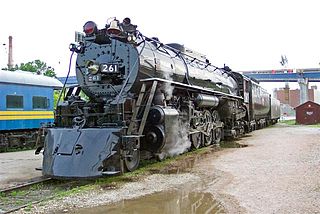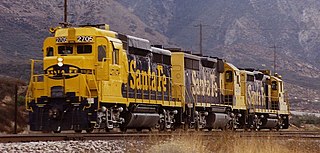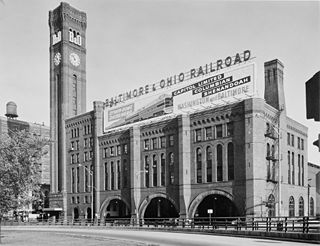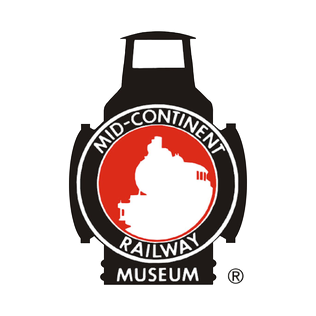
Colfax is a village in Dunn County, Wisconsin, United States. The population was 1,158 at the 2010 census. The village is surrounded by the Town of Colfax.

The Chicago, Milwaukee, St. Paul and Pacific Railroad (CMStP&P), better known as the Milwaukee Road, was a Class I railroad that operated in the Midwest and Northwest of the United States from 1847 until 1986.

The Minnesota Transportation Museum is a transportation museum in Saint Paul, Minnesota, United States.

Milwaukee Road 261 is a class "S3" 4-8-4 "Northern" type steam locomotive built by the American Locomotive Company (ALCO) in Schenectady, New York in July 1944 for the Milwaukee Road.

Saint Paul Union Depot is a historic railroad station and intermodal transit hub in the Lowertown neighborhood of Saint Paul, Minnesota. It serves light rail, intercity rail, intercity bus, and local bus services.

The Soo Line Railroad is one of the primary United States railroad subsidiaries for the CPKC Railway, one of six U.S. Class I railroads, controlled through the Soo Line Corporation. Although it is named for the Minneapolis, St. Paul and Sault Ste. Marie Railroad (MStP&SSM), which was commonly known as the Soo Line after the phonetic spelling of Sault, it was formed in 1961 by the consolidation of that company with two other CPKC subsidiaries: The Duluth, South Shore and Atlantic Railway, and the Wisconsin Central Railway. It is also the successor to other Class I railroads, including the Minneapolis, Northfield and Southern Railway and the Chicago, Milwaukee, St. Paul and Pacific Railroad. On the other hand, a large amount of mileage was spun off in 1987 to Wisconsin Central Ltd., now part of the Canadian National Railway. The Soo Line Railroad and the Delaware and Hudson Railway, CPKC's other major subsidiary, presently do business as the Canadian Pacific Railway (CP). Most equipment has been repainted into the CP scheme, but the U.S. Surface Transportation Board groups all of the company's U.S. subsidiaries under the Soo Line name for reporting purposes. The Minneapolis headquarters are in the Canadian Pacific Plaza building, having moved from the nearby Soo Line Building.

The EMD GP30 is a 2,250 hp (1,680 kW) four-axle diesel-electric locomotive built by General Motors Electro-Motive Division of La Grange, Illinois between July 1961 and November 1963. A total of 948 units were built for railroads in the United States and Canada, including 40 cabless B units for the Union Pacific Railroad.

The EMD FP7 is a 1,500 horsepower (1,100 kW), B-B dual-service passenger and freight-hauling diesel locomotive produced between June 1949 and December 1953 by General Motors' Electro-Motive Division and General Motors Diesel. Final assembly was at GM-EMD's La Grange, Illinois plant, excepting locomotives destined for Canada, in which case final assembly was at GMD's plant in London, Ontario. The FP7 was essentially EMD's F7A locomotive extended by four feet to give greater water capacity for the steam generator for heating passenger trains.
Early Electro-Motive Corporation switcher locomotives were built with Winton 201-A engines. A total of 175 were built between February 1935 and January 1939. Two main series of locomotives were built, distinguished by engine size and output: the straight-8, 600 hp (450 kW) 'S' series, and the V12, 900 hp (670 kW) 'N' series. Both were offered with either one-piece cast underframes from General Steel Castings of Granite City, Illinois, denoted by 'C' after the power identifier, and fabricated, welded underframes built by EMC themselves, denoted by 'W'. This gave four model series: SC, SW, NC and NW. Further developments of the 900 hp (670 kW) models gave model numbers NC1, NC2, NW1, and NW1A, all of which were practically indistinguishable externally from the others, as well as a pair of unique NW4 models for the Missouri Pacific Railroad and a solitary, twin-engined T transfer locomotive model built for the Illinois Central Railroad.

Grand Central Station was a passenger railroad terminal in downtown Chicago, Illinois, from 1890 to 1969. It was located at 201 West Harrison Street on a block bounded by Harrison, Wells and Polk Streets and the Chicago River in the southwestern portion of the Chicago Loop. Grand Central Station was designed by architect Solon Spencer Beman for the Wisconsin Central Railroad (WC), and was completed by the Chicago and Northern Pacific Railroad.

The Illinois Railway Museum is the largest railroad museum in the United States. It is located in the Chicago metropolitan area at 7000 Olson Road in Union, Illinois, 55 miles (89 km) northwest of downtown Chicago.

The Mid-Continent Railway Museum is a railroad museum in North Freedom, Wisconsin, United States. The museum consists of static displays as well as a 7-mile (11 km) round trip ride aboard preserved railroad cars.

The Lake Superior Railroad Museum is a railroad museum in Duluth, Minnesota, United States.

The North Shore Scenic Railroad is a heritage railroad that operates between Duluth and Two Harbors, Minnesota, United States, along 28 miles (45 km) of the Lakefront Line, once part of the Duluth, Missabe and Iron Range Railroad.

The Osceola and St. Croix Valley Railway is a heritage railroad in Osceola, Wisconsin owned and operated by the Minnesota Transportation Museum. It operates on former Minneapolis, St. Paul and Sault Ste. Marie Railroad trackage now owned by the Canadian National Railway.

The Minneapolis Great Northern Depot, also known as Great Northern Station, was a passenger railroad station which served Minneapolis, Minnesota, USA. It was built in 1913 and demolished in 1978. It was located on Hennepin Avenue next to the Hennepin Avenue Bridge and across the street from the main Minneapolis Post Office.

The St. Louis County Depot is a historic railroad station in Duluth, Minnesota, United States. It was built as a union station in 1892, serving seven railroads at its peak. Rail service ceased in 1969 and the building was threatened with demolition until it reopened in 1973 as St. Louis County Heritage & Arts Center . Train service also resumed from 1974 to 1985, by Amtrak.

The Minneapolis, St. Paul and Sault Ste. Marie Railroad (MStP&SSM) was a Class I railroad subsidiary of the Canadian Pacific Railway in the Midwestern United States. Commonly known since its opening in 1884 as the Soo Line after the phonetic spelling of Sault, it was merged with several other major CP subsidiaries on January 1, 1961, to form the Soo Line Railroad.

The Lake Front Depot was a train station in Milwaukee, Wisconsin built in 1889–1890 by the Chicago and North Western Railway (C&NW). It was located near the shore of Lake Michigan at the end of East Wisconsin Avenue, by today's Milwaukee County War Memorial. The structure was built with stone in the Romanesque style, and had a tall clock tower which reached 234 feet (71 m) high. The depot cost $200,000 to build at the time, and eventually served 98 trains a day.

The Frederic Depot is a historic railroad station located at 210 Oak St. W in Frederic, Wisconsin. The station was built in 1901 for the Minneapolis, St. Paul and Sault Ste. Marie Railroad. It was constructed at the Soo Line shops in Minneapolis and shipped to Frederic by rail, where it was assembled. The depot was added to the National Register of Historic Places in 2000.



















